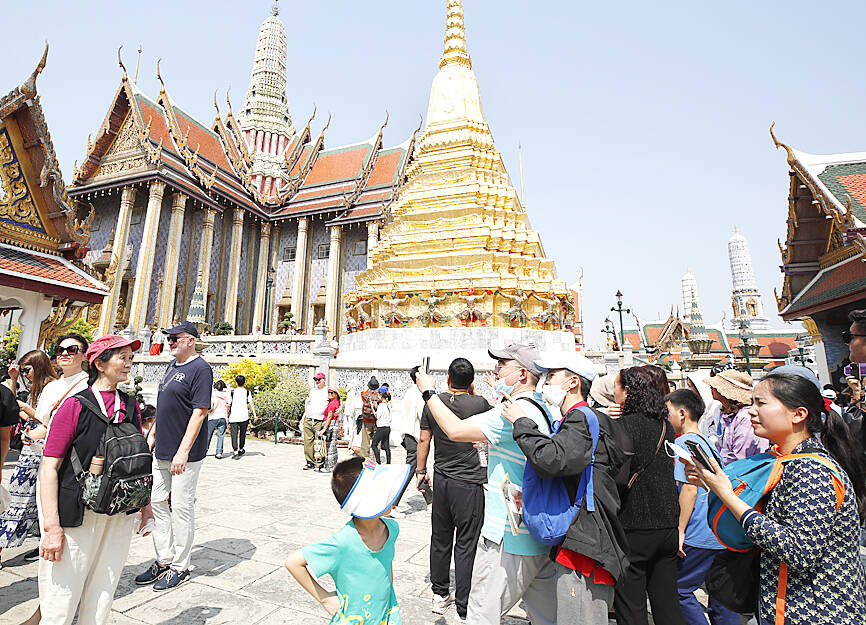Chinese engineer and aviation enthusiast Wei Ming is exactly the kind of visitor the tourism authorities in Singapore, Malaysia and Thailand are looking for.
After Singapore scrapped visas for Chinese citizens, Wei, 44, said he ditched plans to go to Australia and booked a six-day holiday there instead. He said he also looked into visiting Bangkok and Kuala Lumpur, the two other visa-free Southeast Asian countries, but decided on the city-state because of the Singapore Airshow, which opens to the public on Feb. 24.
As thousands of Chinese prepare to go abroad during the first Spring Festival holiday since Beijing lifted the COVID-19 pandemic travel restrictions last year, Singapore, Thailand and Malaysia are hoping their unprecedented visa waivers will lure a large proportion of these visitors — and their much-needed spending.

Photo: EPA-EFE
Chinese travelers often complain about the length of time and the hassle it takes for them to obtain travel visas, and their passport is 62nd on the Henley Passport Index, which ranks the passports of 199 countries according to the number of destinations their holders can access without a prior visa.
While waiving visas can make a destination more attractive, China’s slowing economic growth, job uncertainties and decline in income this year are likely to temper any outbound travel, analysts say.
“There is a feeling that the economic hardships and lack of disposable income are hitting much harder than in other parts of the world and that any travel is therefore staying within China where costs are lower,” said John Grant, chief analyst at travel data firm OAG, adding that the three Southeast Asian countries “may be looking for the trickles.”
Before the pandemic, Chinese tourists were a vital source of revenue, accounting for more than a quarter of all holiday makers to Thailand in 2019. Chinese visitors were also the top spenders in Singapore, splashing out over S$4 billion (US$3 billion) that same year.
Even though fewer Chinese are traveling than before the pandemic, Chinese account for the bulk of visitors to Thailand, which launched its visa waiver in September last year, and tourism authorities there say they expect 177,000 Chinese tourists for the Lunar New Year holiday, more than three times last year’s levels.
“The direction has been good since the visa-free program,” Tourism Authority of Thailand Deputy-Governor Chattan Kunjara Na Ayudhya said. “It’s starting to get back to pre-pandemic levels.”
Malaysia’s visa-free deal for Chinese started in December last year, and it is hoping to attract 5 million to 7 million Chinese visitors this year, which would be almost double pre-pandemic levels.
For the Lunar New Year holiday, hotels including those under The Ascott Limited group, are launching promotions such as discounts and special activities and snacks for the festival.
Because of its status as an Asian air traffic hub, Singapore is ahead of its Southeast Asian rivals in flying in Chinese visitors, with the number of direct flights connecting mainland China rising nearly 5 percent this month from the same month in 2019.
Malaysia and Thailand still have far fewer direct flights: 33 percent and 17 percent less than 2019 levels respectively, data from aviation analytics firm Cirium show.

Taiwan Semiconductor Manufacturing Co (TSMC, 台積電) would not produce its most advanced technologies in the US next year, Minister of Economic Affairs J.W. Kuo (郭智輝) said yesterday. Kuo made the comment during an appearance at the legislature, hours after the chipmaker announced that it would invest an additional US$100 billion to expand its manufacturing operations in the US. Asked by Taiwan People’s Party Legislator-at-large Chang Chi-kai (張啟楷) if TSMC would allow its most advanced technologies, the yet-to-be-released 2-nanometer and 1.6-nanometer processes, to go to the US in the near term, Kuo denied it. TSMC recently opened its first US factory, which produces 4-nanometer

GREAT SUCCESS: Republican Senator Todd Young expressed surprise at Trump’s comments and said he expects the administration to keep the program running US lawmakers who helped secure billions of dollars in subsidies for domestic semiconductor manufacturing rejected US President Donald Trump’s call to revoke the 2022 CHIPS and Science Act, signaling that any repeal effort in the US Congress would fall short. US Senate Minority Leader Chuck Schumer, who negotiated the law, on Wednesday said that Trump’s demand would fail, while a top Republican proponent, US Senator Todd Young, expressed surprise at the president’s comments and said he expects the administration to keep the program running. The CHIPS Act is “essential for America leading the world in tech, leading the world in AI [artificial

REACTIONS: While most analysts were positive about TSMC’s investment, one said the US expansion could disrupt the company’s supply-demand balance Taiwan Semiconductor Manufacturing Co’s (TSMC, 台積電) new US$100 billion investment in the US would exert a positive effect on the chipmaker’s revenue in the medium term on the back of booming artificial intelligence (AI) chip demand from US chip designers, an International Data Corp (IDC) analyst said yesterday. “This is good for TSMC in terms of business expansion, as its major clients for advanced chips are US chip designers,” IDC senior semiconductor research manager Galen Zeng (曾冠瑋) said by telephone yesterday. “Besides, those US companies all consider supply chain resilience a business imperative,” Zeng said. That meant local supply would

BIG INVESTMENT: Hon Hai is building the world’s largest assembly plant for servers based on Nvidia Corp’s state-of-the-art AI chips, Jalisco Governor Pablo Lemus said The construction of Hon Hai Precision Industry Co’s (鴻海精密) massive artificial intelligence (AI) server plant near Guadalajara, Mexico, would be completed in a year despite the threat of new tariffs from US President Donald Trump, Jalisco Governor Pablo Lemus said. Hon Hai, also known as Foxconn Technology Group (富士康科技集團), is investing about US$900 million in what would become the world’s largest assembly plant for servers based on Nvidia Corp’s state-of-the-art GB200 AI chips, Lemus said. The project consists of two phases: the expansion of an existing Hon Hai facility in the municipality of El Salto, and the construction of a